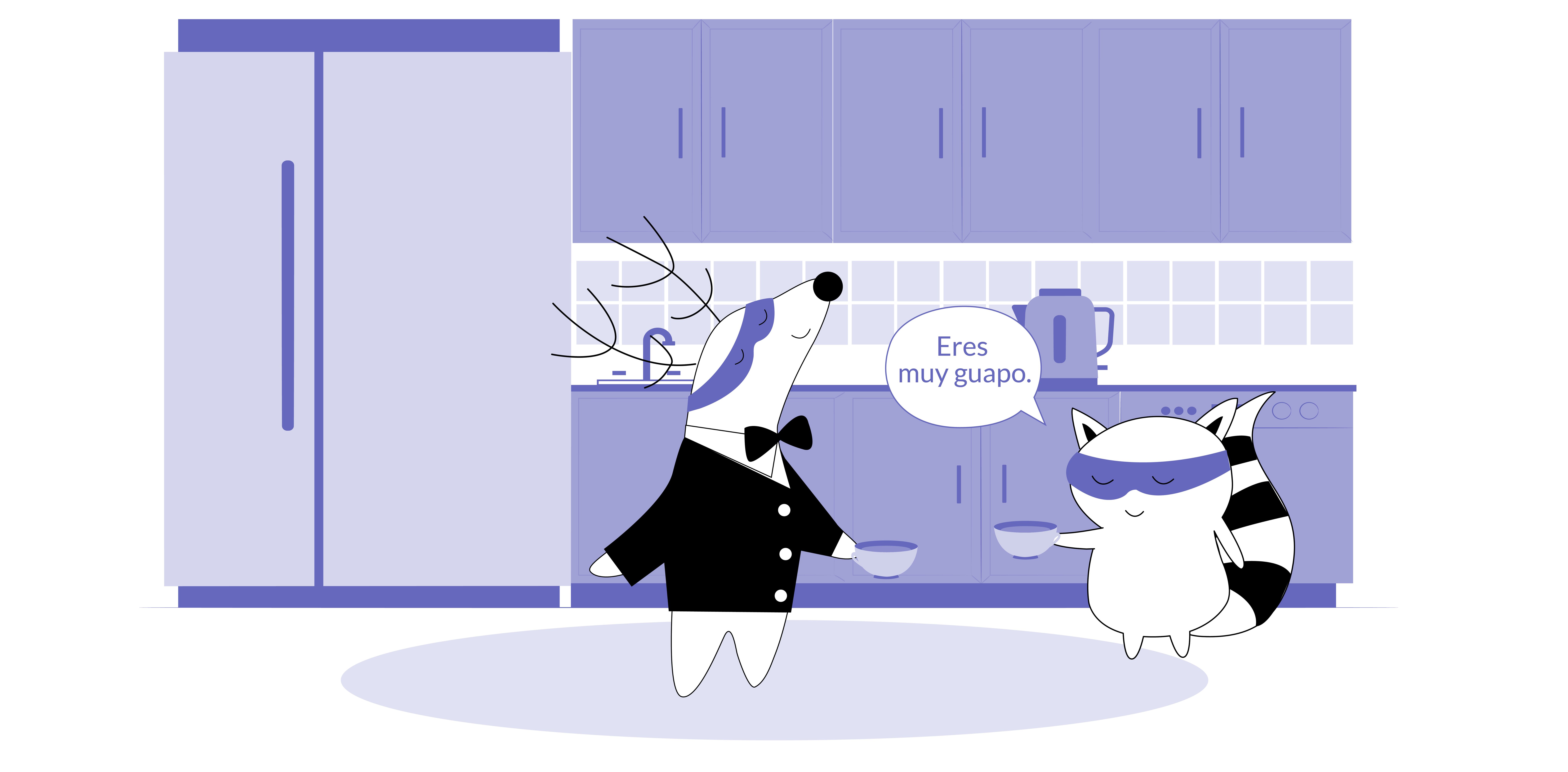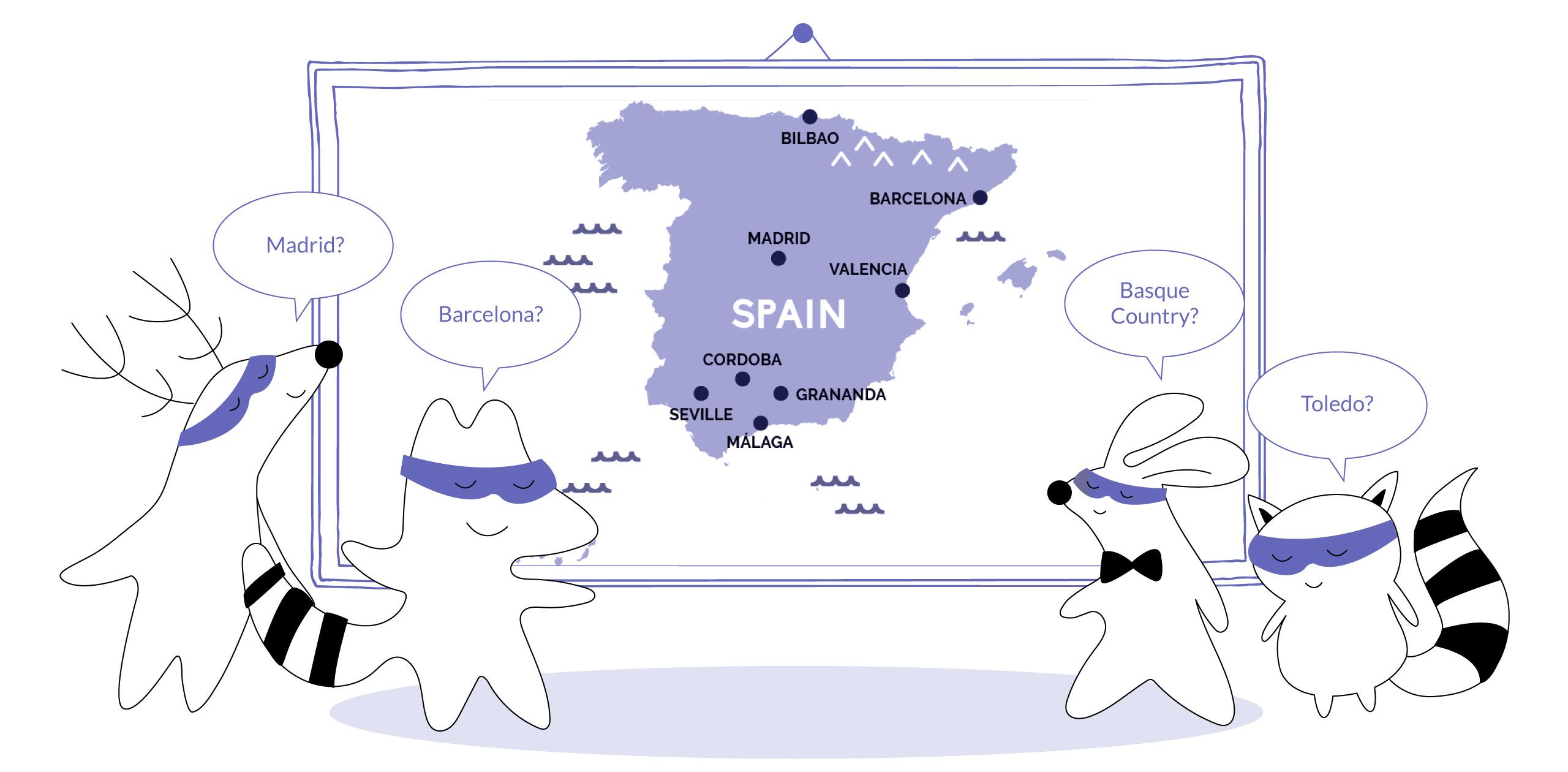
Spanish, like every language, boasts a colorful repertoire of insults and curse words. While we don't advocate using them, exploring these linguistic facets can provide you with valuable insight into Spanish-speaking cultures.
Bear in mind that these expressions can be offensive, so approach them with care and use them sparingly. Let's delve into this intriguing dimension of the Spanish language while keeping respect and cultural sensitivity at the forefront of our exploration.
Learn Spanish with Langster
Why Should You Learn How to Use Insults?
Insults, while not the most pleasant aspect of language, are an integral part of it. They can provide insight into a culture's values, taboos, and social norms. Spanish, with its rich array of colorful insults, is no exception.
Before we proceed, please note that this guide is for educational purposes only. Culture and context are essential when using strong language, so it’s important to be cautious and make sure you understand the appropriate situations to use these phrases. What might be seen as a joke in one context could be highly offensive in another.
For example, you can use gillipollas with your Spanish-speaking friends, but be mindful to not offend anyone in the process.
1. Hijo de puta
"Hijo de puta," which translates literally to "son of a whore," is one of the strongest Spanish curse words. It's considered quite vulgar and is used to express anger or contempt towards someone.
However, it's usage varies greatly depending on the region and context. For example, in some places, it might be used among friends in a joking manner.
Spanish
English
Ese hombre es un hijo de puta por robar mi billetera.
That man is a son of a bitch for stealing my wallet.
2. Mierda

Mierda translates directly to "shit" in English. It is used similarly to how we use the word in English, either as an expletive when something goes wrong or to describe something of poor quality.
Mierda is commonly used to express frustration, disappointment, or anger. It's similar to saying "shit" or "damn" in English when something goes wrong.
Spanish
English
¡Mierda! Perdí el tren.
Shit! I missed the train.
It can also be used to refer to feelings of disapproval, dissatisfaction, or general displeasure with a situation.
Spanish
English
La comida en este restaurante es una mierda.
The food in this restaurant is crap.
Esta película es una completa mierda.
This movie is complete shit.
3. Imbécil
Imbécil is akin to calling someone an imbecile, jerk, moron, or idiot in English. It's used to call out someone's stupidity or ignorance.
Spanish
English
No seas imbécil, eso no es cierto.
Don't be an idiot, that's not true.
4. Pendejo/a
Pendejo/a is a widely used insult in Latin America which generally means "dumbass." However, its literal translation to English is "pubic hair," which shows the creative linguistic liberties taken in insults. It's commonly used to describe someone as foolish, gullible, or lacking in common sense.
Spanish
English
¡Este pendejo no me deja en paz!
This jerk won't leave me alone!
Eres un pendejo si crees que puedes engañarme.
You're a dumbass if you think you can fool me.
In Spanish, -o typically indicates a male form, while -a indicates a female form. Pendejo is the male form, and pendeja is the female form.
Both forms are used to insult people of the respective genders. However, it's essential to be aware of the gender of the person you're addressing, as using the wrong form can affect the impact of the curse word.
5. Cabrón/Cabrona
*cabrona for the female form) is a common and colloquial insult in Spanish, particularly in Mexico. Although it literally translates to "big male goat," its usage goes far beyond the literal meaning. It's used to call someone an asshole, jerk, or a similar derogatory term in English.
Spanish
English
Ese cabrón no sabe de lo que está hablando.
That asshole doesn't know what he's talking about.
Cabrón is the male form of the insult, while cabrona is the female form. The choice between the two depends on the gender of the person being referred to.
6. Yudiputa

Yudiputa is an interesting term because it can be used both positively and negatively. It's an abbreviation of the phrase hijo de puta, and depending on context, it can either mean something is incredibly awesome or express extreme frustration.
Spanish
English
Esta película es la yudiputa!
This movie is freaking awesome!
7. Gilipollas
Gilipollas is another word used to call someone an idiot or jerk. It's similar to pendejo in usage and is commonly used in Spain.
Spanish
English
Deja de actuar como un gilipollas.
Stop acting like an idiot.
This term is informal and impolite, typically used in casual conversations or among friends. It is not suitable for formal or professional contexts and should be used with caution.
8. Me cago en la leche
Me cago en la leche is a unique and colorful Spanish exclamation that literally translates to "I shit in the milk." However, its usage goes beyond the literal meaning as one of many funny Spanish phrases and is commonly used in Spain to express frustration, annoyance, or surprise.
Me cago en la leche is used to express frustration or irritation when something goes wrong or is annoying. It's similar to saying "damn it" or "what the hell" in English.
Spanish
English
Me cago en la leche, perdí el tren de nuevo.
Damn it, I missed the train again.
¡Este tráfico, me cago en la leche!
This traffic, what the hell!
It can also be used to express surprise, amazement, or disbelief, much like saying "holy cow" or "wow" in English.
Spanish
English
Me cago en la leche, ¿has visto lo que ha pasado?
Holy cow, have you seen what just happened?
9. Me cago en Dios
Me cago en Dios is a highly controversial phrase that literally translates to "I shit on God." This is considered extremely blasphemous and disrespectful, especially among religious individuals. Something similar happens with the phrase me cago en todo lo que es sagrado.
Me cago en Dios is a profoundly offensive phrase that directly disrespects religious beliefs and deities. It is used as an expletive to express frustration or anger, akin to saying "God damn it" in English, but it does so in a deeply disrespectful manner.
Spanish
English
Me cago en Dios, ¿por qué no puedo encontrar mis llaves?
God damn it, why can't I find my keys?
The use of this phrase can be not only deeply offensive but also legally problematic in some regions where blasphemy is considered a crime. It's essential to exercise caution and sensitivity when discussing religious matters.
10. Que te folle un pez
Que te folle un pez, which translates to "may a fish have sex with you," is indeed a creative and somewhat humorous insult used in Spanish to express disdain or annoyance toward someone. This phrase showcases the versatility and often humorous nature of insults in language.
Que te folle un pez is a humorous and imaginative way to insult someone. It's used to convey annoyance, frustration, or disdain in a playful or mocking manner.
Spanish
English
Si no te gusta, que te folle un pez.
If you don't like it, then may a fish have sex with you.
This insult is typically used in informal or friendly contexts among people who understand the humorous intent behind it. It's essential to consider your relationship and familiarity with the person you're addressing to avoid causing offense.
11. La concha de la lora
La concha de la lora is a vulgar and colorful phrase originating from Argentina. While it literally translates to "the parrot's shell," it's important to note that the word concha is also a slang term for female genitalia in Spanish. This phrase is used to express frustration, annoyance, or surprise, and it reflects the rich and diverse use of language for expressive communication.
This is a phrase primarily used in Argentina. It reflects the regional diversity of language and the influence of local culture on expressions.
Spanish
English
¡La concha de la lora! Me he cortado el dedo.
Damn it! I've cut my finger.
12. La puta que te parió

La puta que te parió is a strong insult that translates to "the whore that gave birth to you." It is used to insult and demean someone with strong negative emotions like anger or contempt. It's similar to saying "you motherf****r" in English.
Spanish
English
La puta que te parió, me robaste el dinero.
The whore that gave birth to you, you stole my money.
This phrase contains strong vulgar language and is considered highly offensive. It is essential to use it cautiously and be aware of the potential consequences when directing it toward someone.
13. Vete a la mierda
Vete a la mierda is a direct and harsh way to tell someone to "go to hell" or "fuck off." It's used when you're very upset with someone and akin to telling them to go away or leave you alone in a highly negative manner.
Spanish
English
Si no te gustan mis ideas, ¡vete a la mierda!
If you don't like my ideas, go to hell!
This phrase can also be used to reject someone's request or to express exasperation with their behavior or actions.
Spanish
English
¿Puedes prestarme dinero? No, vete a la mierda.
Can you lend me money? No, go to hell.
In summary, this is a direct and harsh way to tell someone to "go to hell" or "f*** off" in Spanish. It is used to express strong displeasure, frustration, or anger and should be used sparingly, particularly in informal and emotionally charged situations.
14. Me cago en tus muertos
Me cago en tus muertos is a highly offensive phrase that translates to "I shit on your dead relatives." It's considered one of the most disrespectful insults in Spanish.
Spanish
English
Me cago en tus muertos, no tienes respeto por nada.
I shit on your dead relatives, you have no respect for anything.
15. Me cago en tu puta madre - me cago en la puta
Me cago en tu puta madre is another extremely offensive phrase that translates to "I shit on your whore mother." This insult is considered one of the harshest in the Spanish language.
Spanish
English
Me cago en tu puta madre, me has traicionado.
I shit on your whore mother, you have betrayed me.
These examples show the diversity and creativity of insults in Spanish. However, they also highlight the importance of understanding cultural context and sensitivity when using language, particularly when it comes to potentially offensive terms.
The Bottom Line

In conclusion, delving into the nuances of a language, including its colloquial expressions and, yes, even its insults, can be a fascinating journey of linguistic and cultural discovery. Remember, while this guide serves to help you understand these versatile Spanish swear words, they are all considered vulgar and should not be used lightly.
If you're passionate about learning Spanish or any other language in a dynamic, effective, and engaging way, we encourage you to explore platforms like Langster. With its real-life stories and interactive lessons, Langster can make your language learning experience both enjoyable and efficient. Happy learning!
Learn Spanish with Langster









